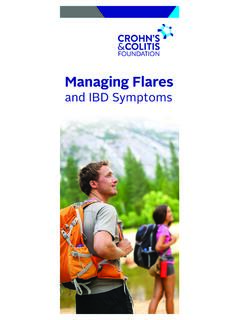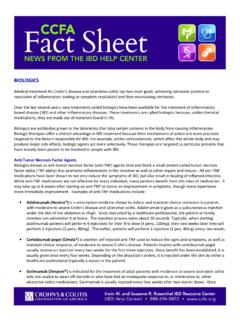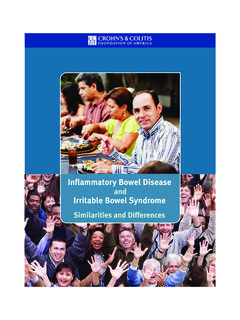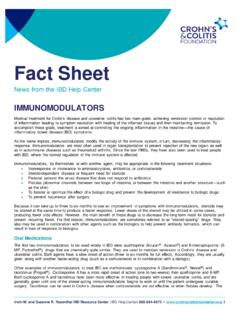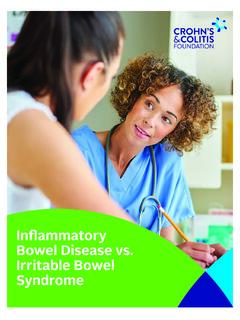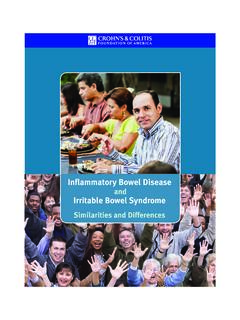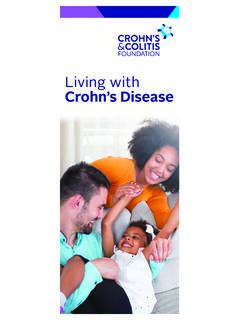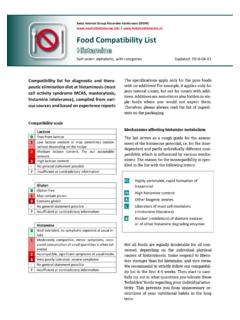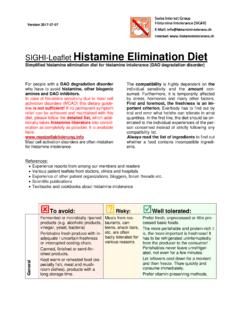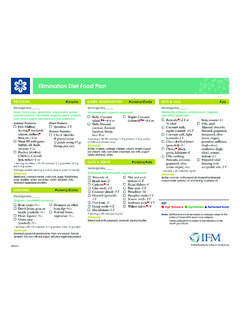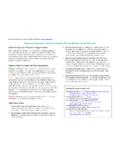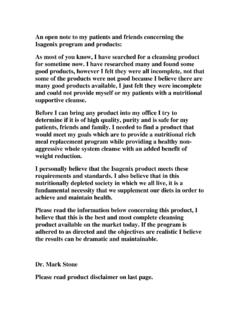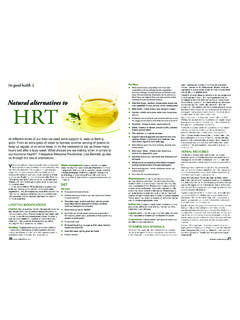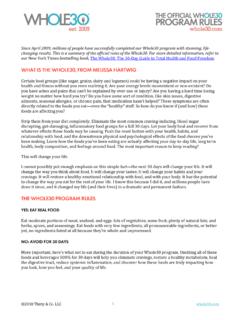Transcription of Diet, Nutrition, and Inflammatory Bowel Disease - IBD
1 ADiet, Nutrition, and Inflammatory Bowel DiseasebInformation contained within this brochure is up-to-date as of the print date. Due to rapid advances and new findings, there may be changes to this information over time. You should always check with your doctor to get the most current information. This information should not replace the recommendations and advice of your s InsideAbout Crohn s & Colitis 2 Impact of IBD on Maintaining Healthy nutrition 4 Healthy diet and Nutritional Choices 8 Tips for Managing IBD with a Healthy diet 15 Vitamin and Mineral Supplementation 25 Guide to Dietary Supplements 30 Nutritional Support Therapy 32 Impact of Surgery on diet and nutrition 34 Managing diet & nutrition During a Flare 35 Final Words About diet , nutrition and IBD 39 diet Research 40 Enclosed Resources 41 Credits 42 Glossary 43 About CCFA Inside Back Cover1 Food choices can become more complicated since certain foods may worsen symptoms.
2 When you are first diagnosed with Crohn s Disease or ulcerative colitis, there are many choices you will need to make. For many people with Crohn s Disease or ulcerative colitis, collectively called Inflammatory Bowel Disease (IBD), the simple act of eating can no longer be taken for granted. Because IBD affects the digestive system, diet and nutrition are im-pacted in a variety of ways. Food choices can become more complicated since certain foods may worsen symptoms. Attention must be paid to avoiding foods that worsen or trigger Disease symptoms. In addition, it is important to learn how to make healthy food choices, replace nutritional deficiencies and maintain a well-balanced nutrient-rich diet . This brochure explains the impact of IBD on diet and nutrition and provides practical information to help you eat well, stay healthy, learn to minimize diet - related problems and enjoy what you Crohn s & ColitisCrohn s Disease and ulcerative colitis belong to a group of conditions known as inflam-matory Bowel diseases (IBD).
3 These disorders cause chronic inflammation in the gastrointestinal (GI) tract, the area of the body where digestion and absorption of nutri-ents take place. Inflammation is the body s re-sponse to tissue injury. Normally, inflammation helps protect the body from harmful germs, damaged cells or irritants, but in IBD, the im-mune system reacts inappropriately, leading to inflammation. Inflammation impairs the ability of affected GI organs to function properly. On-going inflammation leads to symptoms such as abdominal pain and cramping, diarrhea, rectal bleeding, weight loss and fatigue. To learn more about these diseases, view: Living with Crohn s Disease at: Living with Ulcerative Colitis at: Gastrointestinal SystemTo understand the relationship between diet , nutrition and IBD, it is helpful to know how the gastrointestinal tract processes the food we eat. The GI tract consists of a series of mostly hollow organs beginning at the mouth, fol-lowed by the esophagus, stomach, small intes-tine, colon, rectum and anus (see Figure 1).
4 The roles of the gastrointestinal system are: Digestion the breakdown of food Absorption of nutrients and water Elimination of wasteThe Effect of IBD on DigestionIn people with IBD, inflammation in the organs of the digestive tract can affect the process of digestion. Inflammation in the small intestine of a person with Crohn s Disease can interfere with the digestion and absorption of nutrients. Incompletely digested food that travels through the colon may cause diarrhea and abdominal pain. In a person with ulcerative colitis, the small intestine works normally, but the in-flamed colon does not absorb water properly, THE GASTROINTESTINAL (GI) TRACT12387654 Oral CavityEsophagusLiverStomachLarge Intestine/ColonSmall IntestineRectumAnus 12345678 Figure 14resulting in diarrhea, increased urgency to have a Bowel movement and increased frequency of Bowel of IBD on Maintaining Healthy NutritionPeople with IBD may have difficulty maintaining healthy nutrition for a variety of reasons, including Disease symptoms, complications and SymptomsDuring times of Disease flares, diarrhea, urgen-cy to have a Bowel movement, abdominal pain, nausea, vomiting, blood in the stool, constipa-tion, loss of appetite, fatigue and weight loss can negatively impact nutrition .
5 Severe diarrhea can cause dehydration, rob-bing the body of fluids, nutrients and electro-lytes (sodium, potassium, magnesium and phosphorus). People with Crohn s Disease and ulcerative colitis often have a reduced appetite as a result of nausea, abdominal pain or altered taste sensation. This can make it difficult to consume enough calories and obtain sufficient nutrients. Additionally, the need to have numer-ous Bowel movements in a day may cause a per-son with IBD to shy away from eating too much to avoid symptoms. Eating too little puts people at risk for being malnourished. 5 Another possible symptom of IBD is rectal bleeding resulting from sores (ulceration) that form in the inner lining of the intestinal tract, leading to blood loss. Chronic blood loss can eventually lead to anemia, which if left un-checked, may cause fatigue. Weight loss may occur as a result of diarrhea and loss of appetite due to abdominal pain, nausea, vomiting or worsening diarrhea.
6 In addition, the Inflammatory process in Crohn s Disease and ulcerative colitis can result in increased consumption of stored energy and a breakdown of the body s tissues, often resulting in weight loss despite adequate caloric intake. IBD Complications Malabsorption of nutrientsInflammation in the small intestine of a person with Crohn s Disease can interfere with the absorption of nutrients. This is called malab-sorption. Amino acids (from proteins), fatty acids (from fats), sugars (from carbohydrates), vitamins and minerals are mostly absorbed from the last two sections of the small intestine (jejunum and ileum). The degree of malabsorption depends on how much of the small intestine is affected by Crohn s Disease , whether the Disease is active and if any portion of the intestine has been surgically removed. Generally, the malabsorp-tion and nutrient deficiencies tend to be more significant if larger sections of the small intes-tine are inflamed or removed.
7 If a significant portion of the ileum is inflamed or removed, the absorption of fat-soluble vitamins (A, D, E and K) and vitamin B12 will likely be affected. Bile acids or bile salts (responsible for aiding in absorbing fats and making the stool brown in color) can also be malabsorbed if the ileum is inflamed or removed. This can result in excess bile salts being transported to the colon where they cause increased fluid secretion in the colon and watery diarrhea. If a larger section 6of the ileum is affected, malabsorption of fatty acids may occur, resulting in abdominal cramp-ing, diarrhea, malabsorption of fat-soluble vitamins and weight loss. Patients with ulcerative colitis may have less significant nutrient deficiencies; however, weight loss and anemia can be prominent due to severe diarrhea and blood delaysSome children with IBD fail to grow at a normal rate. Possible causes of poor growth include the impact of intestinal inflammation on nutri-tion (as described above in IBD Symptoms ), long-term use of corticosteroid medications (which have a negative impact on bone growth) and general poor nutrition .
8 To minimize the negative effects of IBD on growth, good eating habits, adequate caloric intake and control of the underlying Disease are essential for children. It is also important for children to be monitored carefully for proper weight gain and growth. If your child is not staying on their typical growth curve, it may be necessary to consult your physician or a regis-tered dietitian for help with evaluating caloric and nutrient bone mineral densityDecreased bone mineral density (low bone mass) is common in children, adolescents and adults with IBD. Severe forms of decreased bone mineral density (osteoporosis) increases the risk for bone fracture. This may be due to insufficient calcium intake, poor absorption of calcium, vitamin D deficiency, decreased physi-cal activity, inflammation and/or long-term use of medications such as corticosteroids (as pre-viously discussed). Calcium helps to form and maintain healthy bones and teeth, and vitamin D is needed to help the body use some people with Crohn s Disease , chronic inflammation in the intestine can cause the walls of the intestine to narrow and also form scar tissue.
9 The scar tissue can cause nar-rowing of the passageway, making it difficult for digested food to pass easily through the intestine. Narrowing of the intestine is called a stricture. Dietary modifications such as a low fiber or liquid diet along with medication may be necessary if the stricture is mostly inflam-matory. If the narrowing is mostly scar tissue, surgery may be needed to widen the narrowed section or remove it. A low-fiber or liquid diet is often prescribed until surgery is performed. IBD MedicationsMedications tend to be more effective in people with good nutritional status. Certain medi-cations used in IBD may also have adverse effects on nutrition . Corticosteroids may affect nutrition in many ways by increasing appetite, increasing serum glucose levels, increasing the risk for diabetes and affecting electrolyte (mineral) levels. Although effective for reducing inflammation, steroids have potential adverse effects when used for long periods of time.
10 For example, they can slow the process of new bone formation and accelerate the breakdown of old bone. 8 Steroids also interfere with calcium absorption and may also decrease bone mineral density as previously discussed. Most bone loss occurs in the first six months of corticosteroid use. Supplementation with calcium and vitamin D can help protect bone health, especially while patients are treated with steroids. Patients on sulfasalazine and methotrexate should receive supplemental folic acid. Cho-lestyramine, which is used sometimes to treat bile acid diarrhea, may decrease the absorption of fat-soluble vitamins. Check with your doctor or pharmacist to find out if any of your medica-tions could interfere with your diet and Nutritional Choices diet and nutrition are important aspects of IBD management. diet refers to the foods we eat. nutrition is a term that refers to properly absorbing food and staying healthy.
